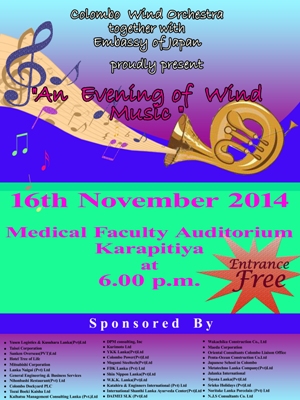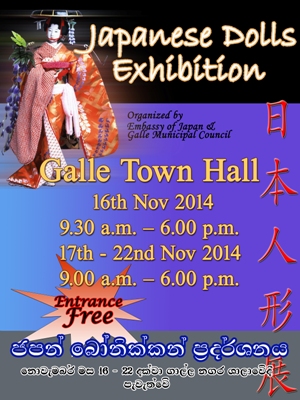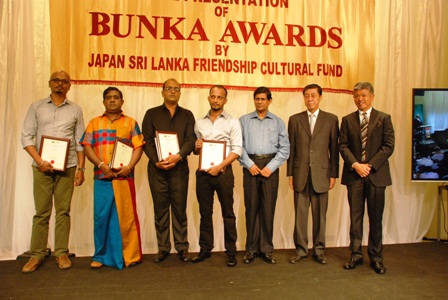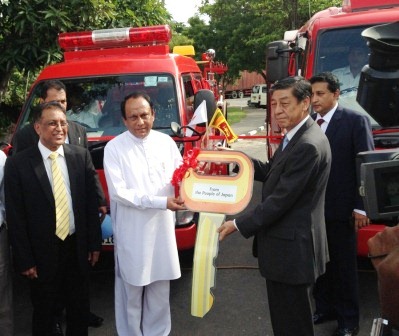The Embassy of Japan in Sri Lanka is also accredited to the Republic of Maldives
PRESS RELEASES 2014
12th December 2014
|
Photo Caption: (L to R) Dr. Thamotharampillai Sanathanan, Mr. Saman Panapitiya, Mr. Tharupathi Munasinghe, Mr. Namal Jayasinghe, Mr. Wasantha Ekanyake, Secretary, Ministry of Culture and the Arts, H.E. Mr. Nobuhito Hobo, Ambassador of Japan and Mr. Naoto Honda, President of Japanese Solidarity Association of Sri Lanka. (Absent-Mrs. Madavi Malwattage) |
The 21st Bunka (Cultural) Awards ceremony organized by the Japan Sri Lanka Friendship Cultural Fund was held on Saturday 1st November at the Sri Lanka Rupavahini Corporation, Colombo 07. The Bunka Awards are presented annually by the Fund, which was established in 1993, on the initiative of the Japanese Solidarity Association and the Japanese Commerce and Industry Association in Sri Lanka, in collaboration with the Embassy of Japan. For the past twenty years, 113 such awards have been presented to mid-career individuals and organizations on the basis of their creative activities in culture and the arts, in order to encourage and promote individual and collective talent in these fields in Sri Lanka. These awards have been presented to artistes in the fields of drama, theatre, dance, music, painting, sculpture and pottery, photography, lyric writing, literature, video animation and visual arts to name a few.
This year the following five Sri Lankan artists received the prestigious Bunka (Cultural) Awards.
| - | Theatre | |
| - | Acting | |
| - | Music | |
| - | Folk Music | |
| - | Painting |
Mr. Wasantha Ekanayake, Secretary, Ministry of Culture and the Arts graced the occasion as Chief Guest, while H.E. Mr. Nobuhito Hobo, Ambassador of Japan, Mr. Naoto Honda, President of the Japanese Solidarity Association of Sri Lanka and a distinguished gathering of invitees including several renowned Sri Lankan cultural artistes were also present on this occasion. The highlight of the ceremony was the cultural performances by the award winners displaying their versatile talents which merited their selection.
The Bunka Awards presentation ceremony will be telecast over Rupavahini shortly for the benefit of the Sri Lankan public.
03rd November 2014
Government of Japan confers prestigious decoration on Merrick Gooneratne
On 3rd November, the Government of Japan announced the conferment of “The Order of the Rising Sun, Gold Rays with Rosette” upon Mr. Merrick Gooneratne in recognition of his invaluable contributions in promoting Japan and Sri Lanka relations.
A congratulatory message was sent by Mr. Fumio Kishida, Minister for Foreign Affairs of Japan, on 3rd November upon the announcement stating: "Please accept my sincerest congratulations on the conferment of ‘The Order of the Rising Sun, Gold Rays with Rosette’, in recognition of your outstanding contribution, and my best wishes for your continued good health and happiness”.
Mr. Merrick Gooneratne, who had his entire education at Maris Stella College, Negombo, is an alumnus of the University of Peradeniya in English, History and Economics and specialized in Economics. He was a Research Scholar who lived and studied in Japan under the Monbukagakusho scholarship scheme and earned his Post Graduate Research Certificate in International Economics from the Kyoto University, Japan. He also completed Module one of the Masters’ Degree Program in Japanese Studies at the University of Colombo. He studied Japanese language at the Osaka University of Foreign Studies, and is fluent in Japanese language conversation.
Having served in the Sri Lanka Administrative Service, which he entered by open competitive examination in 1965, he held the position of Commissioner, Sri Lanka Tea Board in Tokyo, Japan. Since his postgraduate studies in Japan, he had joined the Japanese Graduates Alumni Association of Sri Lanka (JAGAAS) and served as its President for three terms. He was also the Hony. General Secretary of the Lanka - Japan Friendship Society for two terms. In these positions he has actively contributed towards the promotion of friendly relations and socio-economic and cultural linkages between Japan and Sri Lanka in various ways including assisting in organizing seminars, workshops as well as special events.
Mr. Gooneratne has also served as the Vice President of the Sri Lanka Japan Business Cooperation Committee of the Ceylon Chamber of Commerce (SLJBCC) since 2008 to date. In this position, he has assisted in the promotion of investment and trade ties between Japan and Sri Lanka and initiated the first ever “Mega Japan Quiz 2012” for the SLJBCC to mark the 60th anniversary celebrations of diplomatic relations between Japan and Sri Lanka in 2012. He is presently the Executive Director of TOS Lanka Co. (Pvt.) Ltd. – a fully Japanese owned BOI Enterprise in Hi Tech Electronics, in commercial operation since 1995.
He has also held several honorary positions in the State sector as consultant to the Minister of Investment Promotion, Industry and Tourism and member of the Boards of Sri Lanka Tourist Board, Consumer Affairs Authority and Arthur C. Clark Technology Institute. Known for his steadfast loyalty to his Alma Mater, Maris Stella College, he is the first Maristonian to receive this prestigious honour in the over 90-year history of the College. The conferment ceremony will take place on Friday 28th November 2014, at the residence of the Japanese Ambassador at Colombo 7.
29th October 2014
Government of Japan Provides Fire Fighting Vehicles and equipment to BOI
His Excellency Mr. Nobuhito Hobo, Ambassador of Japan handed over 5 Fire Fighting Vehicles and equipment to Hon. Lakshman Yapa Abeywardana, Minister of Investment Promotion for use by the Board of Investment of Sri Lanka (BOI), at the official handing over ceremony held at Katunayake Export Processing Zone on 29 October 2014.
The Government of Japan provided US$83,735(approximately Rs.10 million) in grant towards in for the Project for Improving Fire Units in the Export Processing Zones of Sri Lanka under its Grant Assistance for Grassroots Human Security Projects(GGP).“The Project for Improving Fire Units in Export Processing Zones of Sri Lanka”enabled the BOI to procure 5 used good quality fire engines and fire protection gears from Japan that would contribute to enhance the fire prevention and safety measures in several Export Processing Zones in Sri Lanka. The 5 fire engines were donated by local authorities in Japan (3 from Tokyo Metropolis, 1 from Yokosuka city and 1 from Kasukabe city) and fire protection gears from ‘Inashiki City’through dedicated support from the Society for Promotion of Japanese Diplomacy (SPJD).
The fire engines and protection gears which were handed over to BOI today will be deployed in Free Trade Zones in Katunayake, Biyagama and Seethawaka for enhancing the fire and safety measures in the industrial areas, including factories, machinery, chemical storages and storage yards and mainly to ensure the safety of the staff.
Responding to the provision of this grants, Dr. Lakshman Jayaweera, the chairman of BOI expressed the sincere appreciation and gratitude of BOI to the Embassy of Japan in Sri Lanka for generously contributing towards the execution of the project for improving Fire Units in Export Processing Zones under the BOI by way of a grant for the purpose of procuring 5 units reconditioned fire fighting vehicles and fire fighter protectors from Japan.
This contribution is viewed as momentous in the upgrading of Fire Units, that is expected to create a tremendous impact on the security and safety of human lives and property in and around the Export Processing Zones.This cordial gesture would no doubt further strengthen the warm and friendly relations between our two countries.
22nd October 2014
Japanese Foreign Minister’s Commendation 2014 awarded to a Sri Lankan
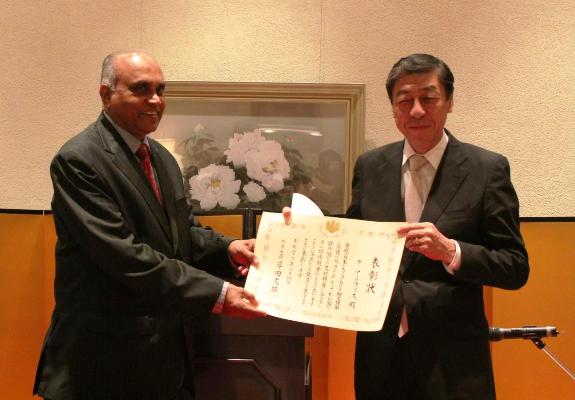
His Excellency Mr. Nobuhito Hobo, Ambassador of Japan, formally awarded the Foreign Minister’s Commendation to Mr. De Alwis, Vice Patron of the Japan Sri Lanka Technical Cultural Association (JASTECA) on behalf of the Foreign Minister of Japan at a special ceremony held on 13th October, 2014 at the Ambassador’s residence in Colombo in the presence of a distinguished gathering. On 24th July this year, the Ministry of Foreign Affairs of Japan announced the list of recipients for the Foreign Minister’s Commendation for the fiscal year 2014. The Foreign Minister’s Commendations are awarded to individuals and groups for their outstanding achievements in international fields, to acknowledge their contribution to the promotion of friendship between Japan and the respective country. The Ministry of Foreign Affairs of Japan has announced the awarding of the Foreign Minister’s Commendation to Mr. Lal de Alwis one of Sri Lanka’s senior executives in the private sector. Mr. Alwis played a pioneering role together with the late Mr. Ian Dias Abeysinghe in establishing the Sri Lanka alumni of AOTS and ABKD known as the Asia Cultural Association in 1965 for the purpose of channeling technical training opportunities for Sri Lankans. In February 1984, Mr. C.L. De Alwis together with Mr. Ian Dias Abeysinghe and assisted by four others established the Japan Sri Lanka Technical Cultural Association (JASTECA). In 1985, he was elected as the Secretary General of the JASTECA and became its President in 1984, 1989, 1990 and 1991 for four years respectively. In 1989, he was unanimously elected to chair the World Convention of AOTS Alumni Societies held in Yokohama, Japan. On his initiative as the Chairman of the World Convention of AOTS an independent fund known as the WNF was established to assist developing countries. He is currently the Vice Patron of JASTECA and a Trustee of the JASTECA Trust. He was also instrumental in securing the assistance of the Asian Fight Oral Cancer organization based in Tokyo headed by Professor Kanichi Seto to fight against oral cancer among Sri Lankans resulting in the cure of over 250 victims. Mr. De Alwis also followed two training programmes organized in Japan by the Asian Productivity Organization and was able to transfer this technology to many private sector companies and government organizations through seminars conducted by JASTECA. In 1983, he also followed the AOTS Programme for Cross-Cultural Management (PCCM) in Japan and was instrumental in introducing the 5S management practices for the first time in Sri Lanka. Since then, JASTECA has organized seminars, workshops and also conducts an annual award scheme known as the Taiki Akimoto 5S awards and Kaizen Awards which have grown in popularity among many organizations and industries in Sri Lanka. Accordingly, Mr. Lal De Alwis has played a key role in promoting JASTECA activities for the last 30 years resulting in the Association being graded as one of the best AOTS Alumni Societies in the world by ATOS. Mr. De Alwis graduated in Business Management in 1976 and holds a Diploma in Professional Diplomacy and World Affairs which he obtained in 2011 conducted by the Bandaranaike International Training Institute. Mr. De Alwis was the President of the National Chamber of Commerce of Sri Lanka for a period of 2 years from 2009 to 2011 and was also elected to chair the Joint Chambers Business Forum comprising of all the trade chambers of Sri Lanka. Mr. de Alwis has served as Managing Director and CEO of several prominent companies in Sri Lanka.
16th September 2014
JAPANESE EDUCATION SEMINAR 2014 “JAPANESE EDUCATION SEMINAR 2014” will be held at the “Anthurium”, Galadari Hotel, Colombo 1 on Saturday 20th September 2014, from 10.00 a.m to 4.00 p.m. This is the fourth successive seminar organized by the Embassy of Japan together with the Japanese Graduates Alumni Association of Sri Lanka (JAGAAS) and the Japan International Cooperation Centre (JICE) in order to assist students interested in obtaining an excellent university education in Japan that will become a launching pad for a bright future career. Admission to this seminar is free of charge. Representatives of a total of 8 educational institutes in Japan, comprising of national and private universities as well as Japanese language schools will participate at this seminar. They are;
“JAPANESE EDUCATION SEMINAR 2014” will be held at the “Anthurium”, Galadari Hotel, Colombo 1 on Saturday 20th September 2014, from 10.00 a.m to 4.00 p.m. This is the fourth successive seminar organized by the Embassy of Japan together with the Japanese Graduates Alumni Association of Sri Lanka (JAGAAS) and the Japan International Cooperation Centre (JICE) in order to assist students interested in obtaining an excellent university education in Japan that will become a launching pad for a bright future career. Admission to this seminar is free of charge. Representatives of a total of 8 educational institutes in Japan, comprising of national and private universities as well as Japanese language schools will participate at this seminar. They are;
-
International University of Japan
-
Ritsumeikan Asia Pacific University (APU)
-
University of Miyazaki
-
Yamaguchi University
-
I.C. Nagoya
-
Meros Language School
-
Ohara Japanese Language School
-
Yokohama Design College
Senior professors and administrative staff of these schools coordinating international study programs will provide detailed information to visitors about their prospectus, the special features and characteristics of their respective schools. Students and visitors will be provided with guidance on admission procedures, study courses, support systems and general student life in Japan. These universities provide high quality undergraduate and post graduate programs in English for international students, while these Japanese language schools provide diploma level certificate courses. The seminar will also provide information about the Monbukagakusho Scholarships awarded by the Government of Japan while members of JAGAAS will provide guidance to visitors in obtaining first-hand information about studying in Japan based upon their own experiences. This seminar is an excellent opportunity for students interested in obtaining a higher education in Japan. Japan warmly welcomes students from Sri Lanka to successfully pursue their studies in Japan and also expects them to appreciate and enjoy the beautiful country and its rich culture.
12th September 2014 Japan supports a Livelihood Improvement Project for the Resettled
Communities through Japanese NGO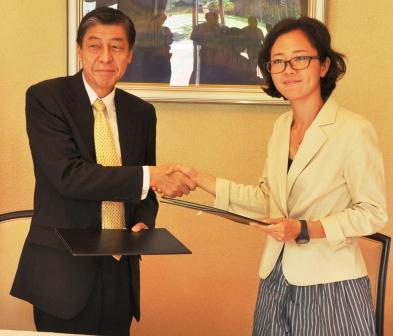
The Government of Japan has extended US$ 224,380 (approximately Rs.30 million)(JPY21,764,860) to the “Reconstruction of Community and Improvement of Livelihood of Returnees in the Fishing Community of Mullaitivu District” project which will be implemented by Pacific Asia Resource Center Interpeople’s Cooperation(PARCIC)in the Mullaitivu District under the Japan-NGO Cooperation Grant Scheme. PARCIC is a Japanese NGO, actively involved inreconstruction and development in the Northern Province since 2004.
This project is for resettled fishery communities to improve their livelihoods. PARCIC has provided 18 common wells and three common halls in the area since 2013. It also has been providing language education programs and after-school classes using the common halls. It helped returnees to quickly recover from the lack of basic living infrastructure, as well as to rebuild the community unity. As a follow-up to that, this project will provide three fish market buildings to the villages in Maritimepattu DS Division, Mullaitivu. Japan is committed, and strongly supports initiatives for global peace and prosperity and hence encouragesSri Lanka’s efforts for national reconciliation as a means of sustaining long-term development in the country. It is in this context that Japan was a key partner in the peace process and provided its unstinted support to reconstruct and rebuild the Northern areas, with highest priority to the welfare of the people. Commenting on the project Ms. Ito, a project coordinator of PARCIC said “this project aim is to strengthen fishery societies in the area. Regardless of theexperience of displacement during the civil war and the shortageof fishing gears, some societies are recovering very well and have restarted their cooperative activities. We hope this project would accelerate their recovery and throughout our program the fishery communitiesas a whole will regain their strength. Everyone in the communities, who has come back to their places after more than 20 year, is eager to rebuild their life, and this project supports those wishes of the communities.” The Grant Contract was signed between His Excellency, Mr. Nobuhito Hobo, Ambassador of Japan and Ms.Fumi Ito, Project Coordinator, PARCIC, on 12th September2014 at the Ambassador’s Residence in Colombo.
09th September 2014 Madam Shiranthi and Madam Akie marked the opening of
“Shine Weeks (Women’s Weeks)”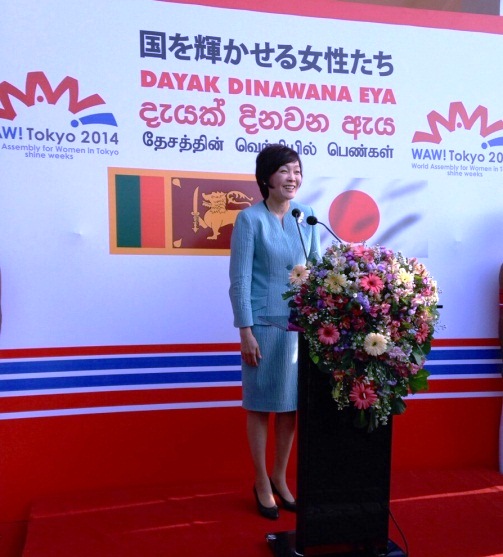
Madam Akie ABE, Spouse of Prime Minister His Excellency Shinzo ABE together with Madam Shiranthi Rajapaksa, First Lady of Sri Lanka marked the opening of “Shine Weeks” on 7th September, 2014 in Colombo, Sri Lanka. Japan hosts a symposium titled “the World Assembly for Women in Tokyo (WAW! Tokyo 2014)” from September 12 to 14, inviting eminent women leaders across the world. Taking this opportunity, Japan positioned the period from September 8 to 19 as “Shine Weeks” in which a series of women-related events will be held all over the world. Madam Akie said “I am grateful that Sri Lanka hosted the exhibition “Dayak Dinawana Eya” as the opening event of the Shine Weeks. Sri Lanka and Japan can collaborate each other in promoting women’s empowerment. I hope that women can play further active roles in both Japan and Sri Lanka.” “Dayak Dinawana Eya” showcased a variety of products by women entrepreneurs from across the country who received support of the Government of Sri Lanka. It also displayed the products by women entrepreneurs, supported by the Government of Japan under the project of “Poverty Alleviation Microfinance Project (PAMP II)” andsupported by two Japanese NGOs, World Vision Japan and PARCIC. The event highlighted the determination of the leaders of the two countries to contribute towards promoting women’s empowerment, which was incorporated in the Joint Statement “A New Partnership between Maritime Countries” signed on the same day between President Rajapaksa and Prime Minister Abe.
09th September 2014 Japan Extended Rs. 17.4 billion for Digitization of Terrestrial Television
Broadcasting Project –‘Ru-Sankya’ The Government of Japan extended a Yen Loan amounting up to Japanese Yen 13.7 billion (approximately Rs. 17.4 billion) to Sri Lanka towards the Digitization of Terrestrial Television Broadcasting Project – ‘Ru-Sankya’. Consequent to the Government of Sri Lankan decision to adopt the Japanese system for Digital Terrestrial Television Broadcasting in Sri Lanka in 2014, the project is expected to develop the information communication infrastructure. Japanese digital TV broadcasting system known as “Integrated Services Digital Broadcasting - Terrestrial (ISDB-T)”is the international standard which is recognized by international organization, and it features three main characteristics, namely, “Multifunctional Data-casting”, “Usage of mobile TV (One-Seg)”, and “Disaster Prevention including Emergency Warning Broadcasting System”. ISDB-T has been adopted by 17 countries including Brazil and Philippines benefitting more than 600 million people. Ministry of Internal Affairs and Communications of Japan will give maximum cooperation in institutional and technical aspects for a smooth transition of Digital Terrestrial Television Broadcasting by ISDB-T in Sri Lanka. The terms of this Yen Loan is highly concessionary coupled with very low interest rates and a 30-year repayment period including a further 10-year grace period. The loan is administrated by Japan International Cooperation Agency (JICA). The Government of Japan has extended Yen Loans amounting to a total of 965.3 billion Yen to Sri Lanka since 1976. Japan hopes that this project would further strengthen the existing bilateral relationships and contribute significantly to enhance the social and economic development in Sri Lanka. The signing of the Exchange of Notes for the Yen Loan took place on September 7, 2014 at the Presidential Secretariat between H.E. Mr. Nobuhito Hobo, Ambassador of Japan on behalf of the Government of Japan and Hon. Mr. Keheliya Rambukwella, Minister for Mass Media and Information on behalf of the Government of Sri Lanka in the presence of H.E. Mr. Shinzo Abe, Prime Minister of Japan, and H.E. Mr. Mahinda Rajapaksa, President of the Democratic Socialist Republic of Sri Lanka.
07th September 2014 Joint Statement between Sri Lanka and Japan
~A New Partnership between Maritime Countries~
-
The Prime Minister of Japan, His Excellency Shinzo Abe, paid an Official Visit to the Democratic Socialist Republic of Sri Lanka from 7 to8 September 2014, on the invitation extended by the President of Sri Lanka, His Excellency Mahinda Rajapaksa, during his Official Working Visit to Japan in March 2013. This is the first visit to Sri Lanka by a Prime Minister of Japan in 24 years since 1990.
-
Prime Minister Abe and President Rajapaksa held a summit meeting on 7 September 2014. Recalling that His Excellency Nobusuke Kishi, the then-Prime Minister of Japan and grandfather of His Excellency Shinzo Abe, paid the first official visit by a Japanese Prime Minister to Sri Lanka in 1957, the two leaders reaffirmed the strong bonds of friendship between the two countries through generations. The two leaders welcomed the important progress made on the initiatives laid out in the Joint Statement of March 2013 on “Strengthening Japan-Sri Lanka Partnership beyond the 60th Anniversary of Diplomatic Relations”, and decided to pursue further action towards this end.
-
Recognizing Sri Lanka’s enormous potential as a maritime nation in the Indian Ocean, the two leaders expressed their determination to elevate Japan-Sri Lanka relations, which have matured and diversified based on the long-standing friendship, into “a new partnership between maritime countries”; and further strengthen the cooperative relations to play significant roles in the stability and prosperity of the Pacific and Indian Ocean regions.
-
Reaffirming the importance of shared values of democracy and the rule of law, the two leaders welcomed the high level constructive exchanges and the reciprocal visits by the Presidents of the Parliamentary Friendship Leagues between the two countries since March 2013. The two leaders reiterated their commitment and decided to promote the policy dialogue at the senior official level of the two Foreign Ministries to expand and consolidate the bilateral relationship.
-
The two leaders noted the strategic geographical location of Sri Lanka, in the Indian Ocean sea lanes straddling Asia and Africa. Bearing in mind the importance of ensuring the freedom and safety of navigation in the region, the two leaders decided to establish the Sri Lanka-Japan Dialogue on Maritime Security and Oceanic Issues in order to effectively address the issues of mutual interest in oceanic issues. With a view to accelerating cooperation on maritime connectivity, the two leaders shared the intention to also promote cooperation in the maritime sector. President Rajapaksa expressed his expectation for cooperation in the fields of ports and harbors development and marine education.
-
Prime Minister Abe expressed his gratitude to the Sri Lankan Government for the facilitation of the port calls by the vessels of the Japan Maritime Self-Defense Force (JMSDF). The two leaders expressed satisfaction with the steady progress in the promotion of cooperation and exchanges between the two defense establishments, as confirmed at the last summit meeting in March 2013.The two leaders decided to further promote cooperation and exchanges in the field of maritime security. The two leaders noted the extensive cooperation highlighted through exercises and the participation at symposiums by JMSDF and the Sri Lanka Navy.
-
The two leaders welcomed the cooperation between coastguards in the fields of maritime law enforcement, Search and Rescue (SAR), disaster risk reduction and environment protection. President Rajapaksa expressed his appreciation for the dispatch of Japanese experts to the Sri Lanka Coast Guard and expressed hope for further assistance for the coast guard capacity improvement through the provision of patrol vessels. Prime Minister Abe reaffirmed the importance of capacity building on maritime safety in Sri Lanka, and stated that the Japan International Cooperation Agency (JICA) would conduct a survey with a view to providing the vessels.
-
Acknowledging that the peace and stability are the desire of all people, the two leaders reaffirmed the importance of national reconciliation for the ever-lasting peace in Sri Lanka, a multi-ethnic and multi-religious country. Prime Minister Abe, while recognizing the progress made so far, reiterated the importance of dialogue among all stakeholders for national reconciliation and further efforts to promote the implementation of the National Plan of Action on the recommendations of the Lessons Learnt and Reconciliation Commission (LLRC). He also highly appreciated the specific actions such as holding the election of the Northern Provincial Council in September 2013,submitting to Parliament the Bill on Assistance to and Protection of Victims and Witnesses, finalizing the report of the Joint Needs Assessment on resettled IDPs, and expanding the mandate of the Presidential Commission of Inquiry on Missing Persons including the establishment of an Advisory Council comprising internationally recognized persons of eminence as domestic initiatives.
-
In order to assist the Sri Lankan Government’s efforts to achieve national reconciliation, the two leaders recalled Japan’s initiatives such as the project for the training of officers in community development in conflict-affected areas and assistance for the trilingual policy, and welcomed recent progress such as the dispatch of experts for promoting agricultural production and marketing in less developed areas. Prime Minister Abe assured that Japan would continue to support Sri Lankan efforts towards a national reconciliation.
-
President Rajapaksa expressed his appreciation for Japan’s continuous and constructive engagement for peace-building, in addition to reconstruction of local infrastructure, promotion of livelihood of rural communities and capacity building for the community organizations, including the launch of a survey on improving capacity of campus complex at the Faculty of Agriculture Killinochchi, University of Jaffna. President Rajapaksa reiterated his government’s ongoing engagement with the international community and the United Nations system. Prime Minister Abe welcomed the continuing engagement of the Government of Sri Lanka, in particular with the Human Rights Council, and its mechanisms, and the Office of High Commissioner for Human Rights (OHCHR), and its willingness to conduct high-level dialogues with UN High Commissioner for Human Rights and the invitation extended to him to visit Sri Lanka during 2014. He also appreciated the scheduling of a meeting in Geneva with the UN Working Group on Enforced or Involuntary Disappearances (UNWGEID) later this month and to seek visit by UNWGEID to Sri Lanka at a mutually appropriate time. Prime Minister Abe appreciated the political leadership of President Rajapaksa towards national reconciliation.
-
President Rajapaksa greatly appreciated Japan’s Official Development Assistance (ODA), which has been playing a significant role in the socio-economic development of Sri Lanka, over the past 60 years since Japan became a member of the Colombo Plan in 1954.President Rajapaksa further detailed his vision in promoting Sri Lanka’s economic and social development by utilizing the advanced technologies of Japan. Prime Minister Abe expressed the willingness of the Government of Japan to continue to support the efforts by the Government of Sri Lanka to achieve its Mahinda Chintana national development policy framework, progress towards achieving Millennium Development Goals, and its commitment to the formulation of the post-2015 development agenda, as well as Sri Lanka’s goal of becoming an upper middle income country, free of poverty by 2020in consideration of human security.
-
Prime Minister Abe welcomed Sri Lanka’s adoption of the Integrated Services Digital Broadcasting-Terrestrial (ISDB-T) as its terrestrial digital television broadcasting system. The two leaders welcomed the signing of the Exchange of Notes for yen loan amounting up to 13.717 billion yen for the Digitalization of Terrestrial Television Broadcasting Project which includes construction of antenna towers, transmitting station buildings, DBNO Administrative Building, Digital TV Centre and electrical equipment work. President Rajapaksa welcomed the implementation of a survey with a view to providing educational and documentary TV programs from the Government of Japan. The two leaders decided to advance bilateral cooperation in the field of information and communication technology (ICT), including capacity building to promote terrestrial digital television broadcasting, which will contribute towards enhancement of cooperation in areas such as disaster prevention, education, traffic control, health care, maritime safety, agriculture, tourism, and e-Government.
-
Recalling that both countries have experienced the devastation wrought by tsunami, the two leaders stressed the importance of building resilience through human resource development, educating people and infrastructure development in facing the challenges posed by such natural disasters. President Rajapaksa expressed his appreciation for Japan’s cooperation towards disaster risk reduction and expressed interest in sharing its experience and expertise. Prime Minister Abe announced to conduct a survey with a view to introducing meteorological radar system and disaster management information system in Sri Lanka, while expressing his intention to continue to extend Japan’s assistance including technical cooperation to Sri Lanka in disaster risk reduction, meteorological forecasting and landslide mitigation activities.
-
The two leaders welcomed the outcome of the study conducted by JICA on transport infrastructure for metropolitan areas including the introduction of suitable mass rapid transit system to mitigate the traffic congestion and eliminate transport bottlenecks. President Rajapaksa expressed his hope that positive outcomes of the JICA study could be incorporated into the Strategy 2020, which is being developed by the Government of Sri Lanka and that Japan's advanced expertise and technologies could be further utilized in implementing concrete projects. Prime Minister Abe expressed his intention that Japan would continue to provide necessary assistance in this field.
-
The two leaders welcomed the recent increase of tourists visiting Sri Lanka, including from Japan, with the advent of peace and stability in the country. In this regard, President Rajapaksa welcomed and appreciated Japan's assistance for seamless implementation of the Bandaranaike International Airport construction project, in particular the progress of its PhaseⅡ.President Rajapaksa also expressed his appreciation for the support of the Government of Japan in infrastructure development in Sri Lanka including the construction of expressways and hydropower projects; and informed of the desire to further explore opportunities for collaboration. President Rajapaksa also appreciated the assistance of Japan towards the preservation of cultural heritage and the promotion of tourism. The two leaders noted the contribution of such cooperation towards enhancing people-to-people exchange.
-
The two leaders shared the view on the importance of utilizing highly-efficient coal-fired power generation technologies in order to reduce greenhouse gas emissions. In this regard, the two leaders welcomed the continuation of the feasibility study being conducted by New Energy and Industrial Technology Development Organization (NEDO) for the construction of a new coal-fired power plant in Trincomalee, and shared the intention to explore the possibility to introduce Japanese industries clean coal technology in Sri Lanka.
-
The two leaders welcomed the ongoing discussion between the Sri Lankan Parliament and the Japanese consortium for refurbishment work of the Parliamentary Complex of Sri Lanka. They expressed their expectation to see further progress in discussions regarding use of Japanese goods and services with appropriate financing.
-
The two leaders welcomed the Japanese contribution so far to develop the medical sector in Sri Lanka and expressed their intention to explore the possibility of further cooperation including medical human resources development.
-
Recognizing the importance of agriculture in national development and its contribution to uplift the living standards of the people of the two countries, the two leaders welcomed signing of the Memorandum of Cooperation in Agriculture and related Fields.
-
The two leaders shared the view on the importance of science, technology and innovation in the development of the national economies. In this regard, the two leaders welcomed the signing of the Letter of Intent between the Ministry of Education, Culture, Sports, Science and Technology of Japan and the Ministry of Technology and Research of the Democratic Socialist Republic of Sri Lanka on Co-operation in the fields of Science, Technology and Innovation.
-
The two leaders noted the consistent economic growth of Sri Lanka and shared the view that Sri Lanka has the potential to become a hub of the Indian Ocean Rim economic zone. The two leaders welcomed the presence of CEOs of renowned Japanese companies in the delegation led by Prime Minister Abe. The two leaders welcomed the holding of the Business Forum in fostering mutually beneficial business alliances between the private sectors of the two countries, and reaffirmed their will to promote and facilitate Japan’s investment to Sri Lanka. The two leaders appreciated the success of the Japan External Trade Organization (JETRO) business mission in October 2013,and its business survey of Sri Lanka Business and welcomed the IT industry related business development initiatives by JETRO.
-
The two leaders welcomed the Memorandum of Cooperation on Vitalization of Inter-governmental Economic Policy Dialogue which was signed between the two countries with a view to expanding bilateral trade, investment and economic engagement.
-
The two leaders expressed their expectations for further investment in Sri Lanka by Japanese companies and welcomed recent investment by Japanese businesses to Sri Lanka in the sectors of finance and logistics. President Rajapaksa assured the promotion of a favourable business environment for Japanese businesses through appropriate follow up on the outcome of the Government-Private Joint Forum held in July 2014.
-
The two leaders appreciated the role played by Japan Sri Lanka Technical And Cultural Association (JASTECA) which is an alumni association of the current Overseas Human Resources and Industry Development Association (HIDA) in introducing Japanese-style management skills and know-how in Sri Lanka.
-
In order to diversify the cooperative links between the two countries and to elevate the friendly relationship, the two leaders stressed the importance of promoting people-to-people exchanges. The two leaders acknowledged the importance of Japan’s substantial assistance to the Academy of Financial Studies (AFS) and public sector training through the Japanese Grant Aid for Human Resource Development Scholarship (JDS) Programme for the capacity building of public sector officials who contribute to the national development of Sri Lanka.
-
Prime Minister Abe referred to his vision of creating a “Society where women shine” and expressed his determination to contribute towards promoting Sri Lankan women’s empowerment. President Rajapaksa expressed his appreciation for Japan’s contribution to women’s empowerment and sought to partner with the initiatives to develop women entrepreneurship.
-
The two leaders reiterated the importance of strengthening cooperation in the area of youth and sports. Prime Minister Abe expressed his intention to reinforce bilateral sports exchanges through the “Sport for Tomorrow” programme.
-
Prime Minister Abe briefed President Rajapaksa on his "Proactive Contribution to Peace" and Japan's Cabinet Decision on the development of seamless security legislation, the concept of which was supported by President Rajapaksa as Japan's own security policy.
-
President Rajapaksa briefed Prime Minister Abe on his vision for the future of Sri Lanka as a hub in Asia. Prime Minister Abe acknowledged this vision, to which Japan could positively contribute.
-
The two leaders reaffirmed the importance of the freedom of navigation and overflight of the high seas, civil aviation safety, unimpeded lawful commerce, and peaceful settlement of disputes in accordance with principles of international law.
-
The two leaders reiterated their call for North Korea to address the concerns of the international community, including the early settlement of the abductions issue. They also urged North Korea to refrain from any further provocative actions including ballistic missile launches, which could hinder the progress of the Six Party Talks, and to take concrete actions towards denuclearization and other goals.
-
President Rajapaksa welcomed Japan’s constructive engagement with the member countries of the South Asian Association for Regional Cooperation (SAARC) and strengthening its connectivity including through the Japan-SAARC Energy Symposium. Prime Minister Abe expressed his intention to further strengthen the relationship with SAARC.
-
Prime Minister Abe expressed his gratitude for Sri Lanka’s continued support for Japan’s permanent membership in the United Nations Security Council. The two leaders shared the intention to work together to achieve concrete outcomes on Security Council reform including the expansion of both the permanent and non-permanent categories next year during the seventieth anniversary of the founding of the United Nations.
-
The two leaders condemned terrorism in all its forms and manifestations, irrespective of their perpetrators, origin and motivations. They emphasized that the evolving character of terrorism and called for stronger international partnership in combating terrorism, including through increased sharing of information and intelligence. They also called for reinvigorating multilateral action on terrorism, including the finalization and adoption of the Comprehensive Convention on International Terrorism in the United Nations at the earliest.
-
The two leaders reaffirmed further cooperation to tackle global issues including climate change, environmental issues and disaster risk reduction, recognizing the importance of addressing these pressing global challenges including the formulation of the post-2015 development agenda, and cooperation towards a new international framework for climate change under the United Nations Framework Convention on Climate Change (UNFCCC) to be adopted at COP21. The two leaders also reaffirmed active participation in the Third World Conference on Disaster Risk Reduction to be held in Sendai, Japan in March 2015 and their cooperation for the success of the Conference.
-
The two leaders reiterated their support for continued cooperation on issues of common interest and relevance in multilateral fora.
-
The two leaders expressed their satisfaction at the outcome of the Official Visit by Prime Minister Abe to Sri Lanka as reflecting the continuing robust relations that exist between the two countries. Prime Minister Abe expressed his gratitude for the warm welcome and courtesy extended by President Rajapaksa and the Sri Lankan people during the visit.
-
Further information regarding this scholarship could be obtained on http://www.mohe.gov.lk
-
For Past Papers of the qualifying examination - http://www.studyjapan.go.jp/en/toj/toj0308e.html
Shared values and policy dialogue
Enhancement of cooperation in the maritime field
Steps towards National Reconciliation in Sri Lanka
Sri Lanka’ s progression to upper-middle income country status
Agricultural Cooperation
Cooperation in the field of science, technology and innovation
Enhancement of trade and investment
Investment inhuman resources
Cooperation in regional and global affairs
|
Colombo |
H. E. Shinzo Abe |
H. E. MahindaRajapaksa |
26th August 2014 JAPANESE CULTURAL EXHIBITION – 2014 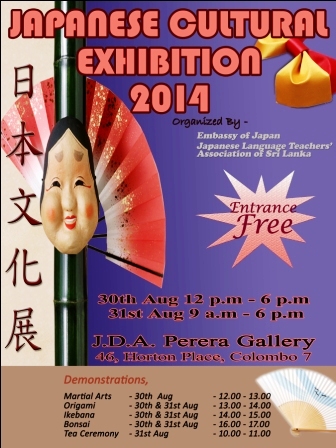 A Japanese Cultural Exhibition will be held at the J.D.A Perera Gallery of the University of Visual and Performing Arts, No.46, Horton Place, Colombo 7, from 30th August to 31st August 2014. The exhibition has been organized by the Embassy of Japan and the Japanese Language Teachers’ Association of Sri Lanka and will feature Ikebana floral arrangements, bonsai plants, origami, as well as demonstrations of the tea ceremony, Ikebana floral art, bonsai planting, origami folding and martial arts. The exhibition will be open to the general public on 30th August from 12.00 noon to 6.00 p.m. and on 31st August from 9.00 a.m. to 6.00.p.m. Admission to the exhibition and demonstrations are free of charge. The exhibition is designed to display Japan’s culture and lifestyle and thereby to further enhance the friendly relations between the peoples of Japan and Sri Lanka. Demonstrations will be held as follows; DEMONSTRATIONS
A Japanese Cultural Exhibition will be held at the J.D.A Perera Gallery of the University of Visual and Performing Arts, No.46, Horton Place, Colombo 7, from 30th August to 31st August 2014. The exhibition has been organized by the Embassy of Japan and the Japanese Language Teachers’ Association of Sri Lanka and will feature Ikebana floral arrangements, bonsai plants, origami, as well as demonstrations of the tea ceremony, Ikebana floral art, bonsai planting, origami folding and martial arts. The exhibition will be open to the general public on 30th August from 12.00 noon to 6.00 p.m. and on 31st August from 9.00 a.m. to 6.00.p.m. Admission to the exhibition and demonstrations are free of charge. The exhibition is designed to display Japan’s culture and lifestyle and thereby to further enhance the friendly relations between the peoples of Japan and Sri Lanka. Demonstrations will be held as follows; DEMONSTRATIONS
Martial Arts - 30th August 12.00 noon
Origami - 30th Aug & 31st Aug 1.00 p.m. to 2.00 p.m.
Ikebana - 30th Aug & 31st Aug 2.00 p.m. to 3.00 p.m.
Bonsai - 30th Aug & 31st Aug 4.00 p.m. to 5.00 p.m.
Tea Ceremony - 31st Aug 10.00 a.m. to 11.00 noon
1st August 2014 Japan approves Rs. 305 millionfor Enhancing Training Capacity of
MILODA, Academy of Financial Studies The Government of Japan approved Rs.305 millionto be financed throughthe counterpart fund under Japan’s non-project grant aid scheme for the capacity development program through MILODA, Academy of Financial Studies (AFS). The programis aimed at institutionalizing and enhancing the capacity of AFS, the training arm of the Ministry of Finance and Planning.The newCo-CEOs jointly selected- Professor J. Hasagawa and Mrs. H.M.N.S. Gunawardana, being the Japanese and Sri Lankan CEOs respectively, assumed duties today the 1st of August 2014, with a Japanese Chief Specialist dispatched from JICE, Japan International Cooperation Center to strengthen the existing local staff. Japan recognizes the paramount importance of enhancing institutional capacity of the public sector, in the transformation of Sri Lanka as an upper-middle-income economy as envisaged in the ‘Mahinda Chintana-Vision for the Future’. The establishment of AFS in January 2013 is a fulfillment of a long felt need and was warmly welcomed by leaders of both Japan and Sri Lanka at their Summit Meeting held in Japan last March. It was hoped that this institution would vitalize the intellectual exchanges between Japan and Sri Lanka. Since last August, JICA has held several seminars at the AFS imparting knowledge on areas of specific importance to the public sector, benefiting senior staff of the Ministry of Finance and Planning and other key institutions coming under its purview. The Government of Japan intends to combine assistance through various channels to support this program so that AFS will be better equipped with improved capacity to design, propose, execute and evaluate national economic and fiscal policies toward promoting investment and economic development for the benefit of the people of Sri Lanka. Around 8,500 managerial staff will benefit through training covering the diverse areas of significance including economic policy, fiscal policy, planning, accounting, revenue administration and related information technology. The Government of Japan sincerely hopes that this assistance will develop AFS as a center of knowledge and excellence for the public finance sector officials in Sri Lanka and continue to acquire regional recognition.
30th July 2014 Japanese Foreign Minister’s Commendation 2014 awarded to a Sri Lankan On 24th July this year, the Ministry of Foreign Affairs of Japan announced the list of recipients for the Foreign Minister’s Commendation for the fiscal year 2014. The Foreign Minister’s Commendations are awarded to individuals and groups for their outstanding achievements in international fields, to acknowledge their contribution to the promotion of friendship between Japan and the respective country.
The Ministry of Foreign Affairs of Japan has announced the awarding of the Foreign Minister’s Commendation to Mr. Lal de Alwis, Vice Patron of the Japan Sri Lanka Technical Cultural Association (JASTECA) and one of Sri Lanka’s senior executives in the private sector. Mr. Alwis played a pioneering role together with the late Mr. Ian Dias Abeysinghe in establishing the Sri Lanka alumni of AOTS and ABKD known as the Asia Cultural Association in 1965 for the purpose of channeling technical training opportunities to Sri Lankans. In February 1984, Mr. C.L. De Alwis together with Mr. Ian Dias Abeysinghe and assisted by four others established the Japan Sri Lanka Technical Cultural Association (JASTECA). In 1985, he was elected as the Secretary General of the JASTECA and became its President in 1984, 1989, 1990 and 1991 for four years respectively. In 1989, he was unanimously elected to chair the World Convention of AOTS Alumni Societies held in Yokohama, Japan. On his initiative as the Chairman of the World Convention of AOTS an independent fund known as the WNF was established to assist developing countries. He is currently the Vice Patron of JASTECA and a Trustee of the JASTECA Trust. He was also instrumental in securing the assistance of the Asian Fight Oral Cancer organization based in Tokyo headed by Professor Kainichi Seto to fight against oral cancer among Sri Lankans resulting in the cure of over 250 victims. Mr. De Alwis also followed two training programmes organized in Japan by the Asian Productivity Organization and was able to transfer this technology to many private sector companies and government organizations through seminars conducted by JASTECA. In 1983, he also followed the AOTS Programme for Cross-Cultural Management (PCCM) in Japan and was instrumental in introducing the 5S management practices for the first time in Sri Lanka. Since then, JASTECA has organized seminars, workshops and also conducts an annual award scheme known as the Taiki Akimoto 5S awards and Kaizen Awards which have grown in popularity among many organizations and industries in Sri Lanka. Accordingly, Mr. Lal De Alwis has played a key role in promoting JASTECA activities for the last 30 years resulting in the Association being graded as one of the best AOTS Alumni Societies in the world by ATOS. Mr. De Alwis graduated in Business Management in 1976 and holds a Diploma in Professional Diplomacy and World Affairs which he obtained in 2011 conducted by the Bandaranaike International Training Institute. Mr. De Alwis was the President of the National Chamber of Commerce of Sri Lanka for a period of 2 years from 2009 to 2011 and was also elected to chair the Joint Chambers Business Forum comprising of all the trade chambers of Sri Lanka. Mr. de Alwis has served as Managing Director and CEO of several prominent companies in Sri Lanka. His Excellency Mr. Nobuhito Hobo, Ambassador of Japan, will formally award this certificate of commendation to Mr. De Alwis on behalf of the Foreign Minister of Japan at a special ceremony to held at the Ambassador’s residence in Colombo in the near future.
2nd June 2014 Japan pledges further Rs.245 million Grant Aid for
Human Resource Development Scholarship 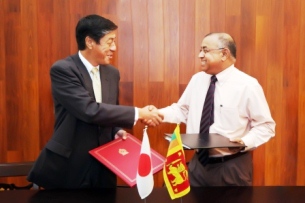 The Government of Japan in September 2014 will commence its Second Phase of Japanese Grant Aid for Human Resources Development Scholarship (JDS) Program based on the official agreement with the Government of Sri Lanka. The Program aims to train, young Sri Lankan officials to become future national leaders of Sri Lanka,highly capable of contributing effectively in the formulation and implementation of national development plans. This program will avail a total of 60 officials in four batches during 2014 to 2017,the opportunity degree to pursue a 2-year Master’s course in the fields of ‘Public Policy and Public Finance’, ‘Economics’, ‘Business Management’, or ‘Environmental Management, Disaster Management, and Climate Change’ at the National Graduate Institute for Policy Studies (GRIPS), Hitotsubashi University, Hiroshima University, Waseda University, International University of Japan (IUJ), University of Tsukuba, and the University of Tokyo. On successful completion of the study program, the officials will be awarded a MA/MSc/MBA. The 1st batch of the Second Phase was open to all Ministries in Sri Lanka, while the First Phase was limited to the Ministries of Finance and Planning, Public Administrations and Home Affairs, Local Government and Provincial Councils and Economic Development. With the expansion of the target groups, 80 officials from 26 Ministries applied for the 2014 program intake. After the selection processes, 15 officials from 11 Ministries were eventually selected for the JDS program. This year the Government of Japan pledged a grant amounting to 215 million Japanese Yen (approximately Rs. 245 million) to cover the cost of the study programs of the 1stbatch of 15 officials in Japan. The signing of the Exchange of Notes for this grant aid scheme took place on 2ndJune, 2014 at the Ministry of Finance and Planning between H.E. Mr. Nobuhito Hobo, Ambassador of Japan on behalf of the Government of Japan and Dr. P.B. Jayasundera, Secretary, Ministry of Finance and Planning on behalf of the Government of Sri Lanka. In addition, the signing of the Grant Agreements took place between Mr. Hiroyuki Abe, Senior Representative of JICA Sri Lanka Office and Dr. P.B. Jayasundera.
The Government of Japan in September 2014 will commence its Second Phase of Japanese Grant Aid for Human Resources Development Scholarship (JDS) Program based on the official agreement with the Government of Sri Lanka. The Program aims to train, young Sri Lankan officials to become future national leaders of Sri Lanka,highly capable of contributing effectively in the formulation and implementation of national development plans. This program will avail a total of 60 officials in four batches during 2014 to 2017,the opportunity degree to pursue a 2-year Master’s course in the fields of ‘Public Policy and Public Finance’, ‘Economics’, ‘Business Management’, or ‘Environmental Management, Disaster Management, and Climate Change’ at the National Graduate Institute for Policy Studies (GRIPS), Hitotsubashi University, Hiroshima University, Waseda University, International University of Japan (IUJ), University of Tsukuba, and the University of Tokyo. On successful completion of the study program, the officials will be awarded a MA/MSc/MBA. The 1st batch of the Second Phase was open to all Ministries in Sri Lanka, while the First Phase was limited to the Ministries of Finance and Planning, Public Administrations and Home Affairs, Local Government and Provincial Councils and Economic Development. With the expansion of the target groups, 80 officials from 26 Ministries applied for the 2014 program intake. After the selection processes, 15 officials from 11 Ministries were eventually selected for the JDS program. This year the Government of Japan pledged a grant amounting to 215 million Japanese Yen (approximately Rs. 245 million) to cover the cost of the study programs of the 1stbatch of 15 officials in Japan. The signing of the Exchange of Notes for this grant aid scheme took place on 2ndJune, 2014 at the Ministry of Finance and Planning between H.E. Mr. Nobuhito Hobo, Ambassador of Japan on behalf of the Government of Japan and Dr. P.B. Jayasundera, Secretary, Ministry of Finance and Planning on behalf of the Government of Sri Lanka. In addition, the signing of the Grant Agreements took place between Mr. Hiroyuki Abe, Senior Representative of JICA Sri Lanka Office and Dr. P.B. Jayasundera.
8th May 2014 Japan's Parliamentary Vice Minister for Foreign Affaires to visit Sri Lanka Hon. Mr.Seiji KIHARA, Parliamentary Vice-Minister for Foreign Affairsof Japan will be arriving in Sri Lanka on Friday 9th May 2014 to further strengthen the long-standing ties between Japan and Sri Lanka. During his visit, Mr. Kihara will call on H. E. Mr. Mahinda Rajapaksa, President, and meet Hon. Basil Rajapaksa, Minister of Economic Development and other Government officials to explore new avenues of bilateral cooperation between the two countries. Mr.Kihara will visit the Colombo Port and the National Blood Centre which were constructed with Japanese Official Development Assistance (ODA), and also visit the Colombo Dockyard which operates in partnership with Onomichi Dockyard Co. Ltd. of Japan for more than 20 years.
April 29, 2014 Tokyo Cement Receives Commendation from Ambassador of Japan 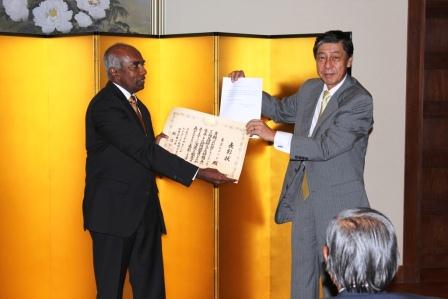
H.E. Ambassador Nobuhito Hobo awarding the commendation to
Mr. Simon Rajaseelan Gnanam, MD of Tokyo Cement H.E. Mr. Nobuhito Hobo, Ambassador of Japan extends his heartiest congratulations to Tokyo Cement Company (Lanka) PLC in recognition of the distinguished service in contributing to the deepening of mutual understanding and friendship between Japan and Sri Lanka. Tokyo Cement was incorporated in 1982 by the late Deshamanya A. Y. S. Gnanam with Mitsui Mining Company in Japan. The company kept operating even in difficult times during the conflict tobecome indisputably the leading company in the cement industry in Sri Lanka. Tokyo Cement contributes to the economic development and employment generation with its high quality production in Sri Lanka, especially in Eastern Province. By using biomass power plant and only renewable biomass energy sources as fuel for production process,Tokyo Cement has promoted sustainable development and green power in Sri Lanka. Furthermore, Tokyo Cement is a pioneer in the area of corporate social responsibility (CSR). Their activities are wide-ranging which include projects such as AYS Gnanam Construction Training Academy, Tokyo Cement All Island Schools’ Quiz, Murali’s Unity through Cricket, Mid Day Meals as School Nutrition Program, Post Tsunami Relief, Empowering Farming Communities, Mangrove Reforestation, and Corals Rehabilitation. Some of them are conducted jointly with the Sri Lankan Government and NGOs. 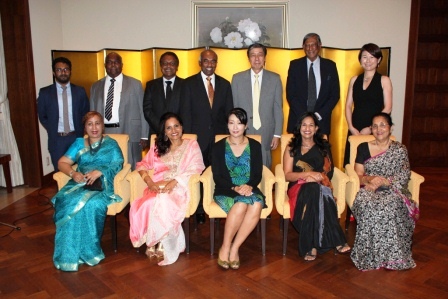
Participants at the Ceremony The Commendation from Ambassador of Japan is awarded to Tokyo Cement to commemorate notable contributions in enhancing the Sri Lankan economic development by joint business partnership between Japan and Sri Lanka. Tokyo Cement’s business performance, its unique environment of measures and CSR activities present good practices in solving the structural issues in Sri Lanka. The ceremony to confer the certification of commendation from Ambassador of Japan was held on April 28, 2014 at the Ambassador’s residence.
24th April 2014 JAPANESE GOVERNMENT SCHOLARSHIP 2015
(MONBUKAGAKUSHO – MEXT) The Government of Japan will award scholarships to Sri Lankan Students under the Monbukagakusho (Ministry of Education, Culture, Sports, Science and Technology:MEXT) Scholarship scheme 2015, in the categories of Postgraduate Research, Undergraduate and College of Technology. The closing date for applications to the Ministry of Higher Education is on 23rd May 2014. Selection of candidates will be done through an examination conducted jointly by the Japanese Embassy and the Ministry of Higher Education. Prospective candidates are kindly requested to forward their applications to the Ministry of Higher Education, No. 18, Ward Place, Colombo 07. Application forms can be downloaded from the website of the Ministry of Higher Education. Application forms downloaded from the website of the Government of Japan will not be accepted for the preliminary processing. Applicants who have only passed G.C.E. A Level should apply for ONE SCHEME ONLY (Either Undergraduate or College of Technology).
March 28, 2014 Japan Provides Rs. 44 billion for Construction of Second Kelani Bridge The Government of Japan extended the 44thYen Loan amounting to Japanese Yen 35,020 million (approximately Rs. 45billion) to Sri Lanka towards the Second New Kelani Bridge Construction Project. The project would provide for a new 6-lane elevated bridge parallel to the existing New Kelani Bridge in order to accommodate the heavy inflow of traffic along and around the New Kelani Bridge. The new bridge will serve as a gateway to Colombo, since it will extend link-up with the Colombo Katunayake Expressway as well as have access to the Port Access Road and Baseline Road. The Government of Japan has assisted in the development of Sri Lanka’s road network in numerous ways aimed at improving connectivity, where it supported the construction of the Southern Expressway, Outer Circular Expressway as well as the construction of a large number of rural roads and bridges throughout the country. The terms of the 44th Yen Loan is highly concessionary with very low interest rates and long-term repayment period that includes a 10 year grace period and the loan is administered by Japan’s International Cooperation Agency.The Government of Japan has extended Yen Loans amounting to a total of 951.6 billion Yen to Sri Lanka since 1977. All projects under the Yen Loan scheme are in line with the needs identified by the Government of Sri Lanka and are considered as national importance in terms of facilitating social and economic development in the country. Japan hopes that these projects would enhance Japan’s long-term cooperation in Sri Lanka’s overall development process and improve the living conditions of the people.The signing of the Exchange of Notes for the Yen Loan took place on March 28th at the Ministry of Finance and Planning between H.E. Mr. Nobuhito Hobo, Ambassador of Japan on behalf of the Government of Japan and Dr. P.B. Jayasundera, Secretary, Ministry of Finance and Planning on behalf of the Government of Sri Lanka.
March 19, 2014 Japan provides food aid to support WFP’s Emergency Program and
School Meals Program in the North The Government of Japan will provide food grant assistance to the value of 160 million Japanese Yen (approximately Rs.203million) to the Government of Sri Lanka through the World Food Program (WFP) to support their ongoing emergency program in Sri Lanka including the School Meals Program. The distribution of the food assistance will be supervised by the Ministry of Economic Development. In 2012 and 2013, the Government of Japan provided food grant assistance amounting to 120 million Japanese Yen and 220 million Japanese Yen respectively to the Government of Sri Lanka through the WFP in order to sustain the Schools Meals Program. Good nutrition is a major factor in the physical as well as mental growth of children and supporting this program is of much importance to the welfare of Sri Lanka’s future generation. Under this food grant assistance, Japan will provide canned fish manufactured in the areas devastated by the Great East Japan Earthquake and Tsunami, but processed in an area with no radiation threat and examined for safety by a third party organization. The products are the same as those sold in the Japanese market.The grant assistance will be mutually beneficial to both Japan and Sri Lanka. Japan hopes this assistance would strengthen the long-standing friendship between our two countries. The signing of the grant agreement took place in Rome on March 12th, 2014 between H.E. Mr. Masaharu Kohno, Ambassador Extraordinary and Plenipotentiary of Japan to Italy and Ms. Ertharin Cousin, Executive Director, UN World Food Programme.
14th March 2014
Japan extended Rs.14 million to Sarvodaya Suwasetha Sewa Society 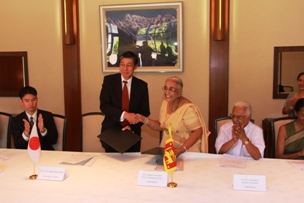
The Government of Japan has provided US$111,113(approximately Rs.14 million) grantaid for ‘The Project for Upgrading a Girl’s Home in Kurunegala District’ under its Grant Assistance for Grassroots Human Security Projects(GGP).
The Project for Upgrading a Girl’s Home in Kurunegala District” will help to renovate the 2-story building in the Wariyapola girl’s home,Kurunegala, the construction of a new building for pre-school and vocational training center with necessary equipment in order to improve the security, health & educational environment at Wariyapola Girl’s home run by Sarvodaya Suwasetha Sewa Society with full support from Sugiura Bramcharia Foundation.
The Wariyapola Girl’s home at present helps 43 girls to become healthy both physically and psychologically and to be integrated into society with more confidence and independence. The Center also provides services to young girls in the vicinity to develop their vocational skills such as flower-making, and sewing. In addition, the center provides kinder garden/ pre-school facilities to neighborhood children from low income families to acquire quality education under a safer and child friendly environment.
Dr. A.T. Ariyaratne, Founder / President of Lanka Jathika Sarvodaya Shramadana Sangamaya and Mrs. Neetha Ariyaratne, Hony. General Secretary, Lanka Jathika Sarvodaya Shramadana Sangamaya stated that “the Wariyapola vocational training centre serves young girls from the village and the pre-school serves children from the community. The proposed new building that will be constructed through Japan’s Grant Assistance will serve both the young girls at the Vocational Training Centre and Pre-School children with better facilities. This is the only facility for girls in the North Western Region of Sri Lanka where so many mothers have left to the Middle East for employment leaving their children as a vulnerable group. This centre comes under the supervision of the Probation & Child Care Services Department of the North Central Province”.
The Grant Contract between His Excellency Mr. Nobuhito Hobo, Ambassador of Japan and Mrs. NeethaAriyaratne, Hony. General Secretary, Sarvodaya Suwasetha Sewa Society was signed on March 14, 2014 at the Ambassador’s Residence in Colombo.
11th March 2014 Japan SupportsUN Habitat for Rehabilitation of Conflict Affected Areas and
Empowerment of Women in Northern and Eastern Provinces 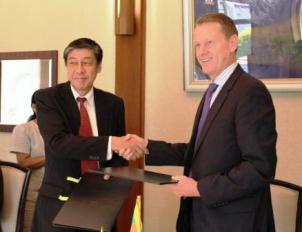
The Government of Japan will extend financial contribution amounting to 377 million Japanese Yen (approximately US$ 3.7 million) through UN Habitat for “The Project for Rehabilitation of Community Infrastructure, Improvement of Livelihoods and Empowerment of Women in the Northern and Eastern Provinces”. The signing of the Exchange of Notes between H.E. Mr. Nobuhito Hobo, Ambassador of Japan to Sri Lanka andMr. Tim McNair, Chief Technical Advisor, UN-HABITAT took place at the Ambassador’s Residence on March 11thin the presence of Mr. JanakaSugathadasa, Secretary, Ministry of Resettlement. The project is intended to address the reintegration needs of the communities in the districts of Killinochchi, Mullaitivu, and Mannar in the Northern Province and Batticaloa in the Eastern Province through sustainable rehabilitation and reconstruction assistance and the improvement of basic services. Therefore, the project activities includes; (1) the rehabilitation and reconstruction of damaged small community infrastructure; (2)improving economic opportunity through improving access roads, storage facilities, irrigation channels and skills development in the communities;(3) empowering women through vocational and leadership training, and the introduction of savings and credit; and (4) facilitating communities to live with wild elephants. This project is designed based on the experiences of “The project for Rehabilitation of Community Infrastructure and Facilities in the Conflict Affected Areas in Northern Province’, to which Japan provided US$3.6 million and will have more focus on access to economic opportunities and empowerment of women. This approach will no doubt create a suitable environment for sustainable social and economic development in due consideration of the empowerment of women. The Government of Japan will continue its proactive support for the recovery in the emerging regions, and towards the overall development in the countryin cooperation with the Government of Sri Lanka as well as the international community and NGOs.
10th March, 2014 Japan extended Rs. 10 million to Board of Investment of Sri Lanka 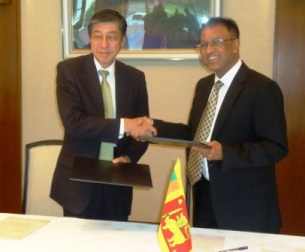
The Government of Japan has provided US$83,735 (approximately Rs.10 million) grantaid for the Project for Improving Fire Units in Export Processing Zones of Sri Lanka underits Grant Assistance for Grassroots Human SecurityProjects(GGP). “TheProject for Improving Fire Units in Export Processing Zones of Sri Lanka” will help to procure 5 used fire engines and fire protections gears from Japan. The project to be implemented by Board of Investment of Sri Lanka (BOI), would contribute to enhance the safety of human lives by providing upgraded fire fighting and security services in the areas of its operation. 5 used fire engines are donated by local authorities (3 from Tokyo Metropolis, 1 from Yokosuka city and 1 from Kasukabe city) and fire protection gears from Inashiki City through dedicated support by the Society for Promotion of Japanese Diplomacy (SPJD), which has a scheme to coordinate donation of second-hand vehicles such as fire engines to foreign countries. The fire engines and protection gears procured under this project will be deployed to Free Trade Zones in Katunayake, Biyagama and Seethawaka for the better security conditions of industrial areas, factories, machinery, chemical storages and storage yards and also for the safety of the lives of the staff. Dr. Lakshman Jayaweera, the Chairman of BOI said that BOI wishes to express its sincere appreciation and gratitude to the Embassy of Japan in Sri Lanka for generously contributing towards the execution of the project for improving Fire Units in Export Processing Zones under the BOI by way of a grant for the purpose of procuring 05 units reconditioned fire fighting vehicles and fire fighter protectors from Japan.
This contribution is viewed as momentous in the upgrading of Fire Units, enabling towards creating a tremendous impact on the security and safety of human lives and property rapidly increasing in and around the Export Processing Zones. This cordial gesture is also viewed as further strengthening warm and friendly relations between the two countries. The Grant Contract between His Excellency Mr. Nobuhito Hobo, Ambassador of Japan and Dr. Lakshman Jayaweerawas signed on March 10, 2013 at the Ambassador’s Residence in Colombo.
7th March 2014 Japan Provides Rs. 100 million to promote Trilingual Language Policy in Sri Lanka The Government of Japan has granted Rs. 100millionunder its Non-Project Counterpart Fund for implementing the following two projects identified by the Government of Sri Lanka, aimed at facilitating the implementation of the Trilingual Language Policy of Sri Lanka.
1. Capacity building of language teachers in the general education system promoting a Trilingual Sri Lanka: Rs. 80.24 million will be provided for this project for teacher development and capacity building by improving the quality of learning and teaching of Sinhala, Tamil, and English to promote trilingual Sri Lanka. The project will be implemented by the Ministry of Education and would support the development of teacher training material and conducting of training programs at provincial, zonal and divisional levels, establishment of quality circles of language teachers etc.
2. Preparation of handbook for the use of government officers in all IV levels: Rs. 20 million will be provided for this project for printing of study packs based on syllables prepared for second language proficiency in all four levels of public officers and the printing of related course modules. This project will be implemented by the Ministry of National Languages and Social Integration. The two projects are expected to benefit around 54,150 of language teachers (Sinhala, Tamil, and English), nearly 4 million primary to secondary level students and 1.3 million public officers and the general public as a whole. Japan considers these two projects of great importance in terms of facilitating national reconciliation through promoting a Trilingual Sri Lanka enabling all communities to communicate with each other with ease and understanding. Japan hopes that these projects will enhance the government’s efforts towards reconciliation.
Japan extended Rs. 25 million to Provincial Director of Health Services, Sabaragamuwa
and Surangani Voluntary Services, Monaragala
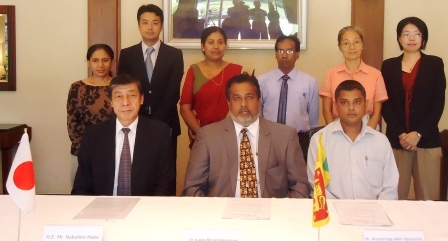
 Dr. Kapila Bimal Kannangara, Provincial Director of Health Services, Sabaragamuwa Province said that “the project for Upgrading Divisional Hospital Chandrikawewa is supported by the Embassy which would help the Health Department of Sabaragamuwa to provide a quality service to the Chandrikawewa Hospital. The hospital serves nearly 60,000 to 75,000 population from Embilipitiya Divisional Secretary’s area in the Ratnapura District and many others living close by in the adjoining Hambanthota District. The hospital strives to provide comprehensive Primary Health Care Facilities to the people”. The ‘‘Project for Enhancing the Livelihoods of the Families with Disabilities in Monaragala’’ implemented by Surangani Voluntary Services, which receives US$ 125,152 (approximately 16 million), is intended to support income generation avenues of families with disabled members in Monaragala district to improve their living conditions and upgrade the status in the society.
Dr. Kapila Bimal Kannangara, Provincial Director of Health Services, Sabaragamuwa Province said that “the project for Upgrading Divisional Hospital Chandrikawewa is supported by the Embassy which would help the Health Department of Sabaragamuwa to provide a quality service to the Chandrikawewa Hospital. The hospital serves nearly 60,000 to 75,000 population from Embilipitiya Divisional Secretary’s area in the Ratnapura District and many others living close by in the adjoining Hambanthota District. The hospital strives to provide comprehensive Primary Health Care Facilities to the people”. The ‘‘Project for Enhancing the Livelihoods of the Families with Disabilities in Monaragala’’ implemented by Surangani Voluntary Services, which receives US$ 125,152 (approximately 16 million), is intended to support income generation avenues of families with disabled members in Monaragala district to improve their living conditions and upgrade the status in the society. 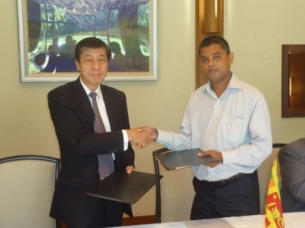 Mr. Wickramage Nalin Vipulendra, President of Surangani Voluntary Services stated that “Surangani Voluntary Services has been working with children with special needs and their families who are economically-challenged and this project focuses on establishing self-support and improvement of the economic conditions of their families”. The Grant Contract between His Excellency Mr. Nobuhito Hobo, Ambassador of Japan and Dr. Kapila Bimal Kannangara, Provincial Director of Health Services, Sabaragamuwa Province and Mr. Wickramage Nalin Vipulendra, President of Surangani Voluntary Services was signed on 07, March 2014 at the Ambassador’s Residence in Colombo.
Mr. Wickramage Nalin Vipulendra, President of Surangani Voluntary Services stated that “Surangani Voluntary Services has been working with children with special needs and their families who are economically-challenged and this project focuses on establishing self-support and improvement of the economic conditions of their families”. The Grant Contract between His Excellency Mr. Nobuhito Hobo, Ambassador of Japan and Dr. Kapila Bimal Kannangara, Provincial Director of Health Services, Sabaragamuwa Province and Mr. Wickramage Nalin Vipulendra, President of Surangani Voluntary Services was signed on 07, March 2014 at the Ambassador’s Residence in Colombo.
3rd March, 2014 Japan Extended US$ 716,608 for Humanitarian Demining in Northern Sri Lanka 
The Government of Japan has provided a total sum of US$ 716,608 (approximately Rs. 92 million) in grant aid for humanitarian demining in Northern Sri Lanka under its Grant Assistance for Grassroots Human Security Project (GGP). The ‘Project for Humanitarian Mine Clearance for Resettlement and Livelihoods in Northern Sri Lanka’, implemented by The HALO Trust has been provided a sum of US$ 716,608 (approximately Rs. 92 million) which would contribute to expedite the efforts of the Government of Sri Lanka to make mine contaminated areas safe lands for people to return and resume their livelihood. Japan has been a major donor supporting mine clearance in Sri Lanka to accelerate the return and resettlement of Internal Displaced Persons (IDPs) and to facilitate recommencement of agriculture and other livelihood activities of returnees. Mr. Stanislav Damjanovic, Programme Manager, The HALO Trust noted that HALO was honored to be recognized as a trustworthy partner by the Government of Japan that had been funding our demining activities since 2003. Japan has played a major role in reducing the mine threat in Sri Lanka and is continuing to be one of the major donors for demining. This new grant will directly benefit some 5000 people and indirectly benefit a further 45000 people living in some of the most mine affected communities in northern Sri Lanka. HALO's mine clearance intervention funded by Japan will continue to help the most impoverished communities in northern Sri Lanka who are striving to recover their lives and livelihoods.
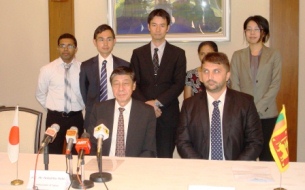 The Grant Contract was signed between His Excellency Mr. Nobuhito Hobo, Ambassador of Japan and Mr. Stanislav Damjanovic, Programme Manager, The HALO Trust on 3rd March 2014 at the Ambassador’s Residence in Colombo.
The Grant Contract was signed between His Excellency Mr. Nobuhito Hobo, Ambassador of Japan and Mr. Stanislav Damjanovic, Programme Manager, The HALO Trust on 3rd March 2014 at the Ambassador’s Residence in Colombo.
21stFebruary 2014 Japan Provides Rs.70 Million to a Livelihood Project for Returnees
in the Northern Part of Sri Lanka
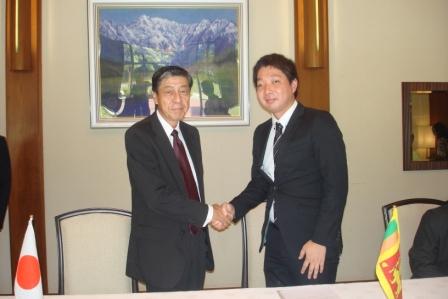 The Government of Japan has extended US$ 543,300 (approximately Rs. 70 million) to the “Assistance in Livelihood and Community Strengthening for Returnees in Mullaitive and Kilinochchi District” to be implemented by JEN, a Japanese NGO, in order to improve the livelihood of the resettled communities in the Northern provinces under the Japan-NGO cooperation Grant scheme funded by the Government of Japan.
The Government of Japan has extended US$ 543,300 (approximately Rs. 70 million) to the “Assistance in Livelihood and Community Strengthening for Returnees in Mullaitive and Kilinochchi District” to be implemented by JEN, a Japanese NGO, in order to improve the livelihood of the resettled communities in the Northern provinces under the Japan-NGO cooperation Grant scheme funded by the Government of Japan.
The project titled “Assistance in Livelihood and Community Strengthening for Returnees in Mullaitive and Kilinochchi District” will support to rehabilitate and uplift livelihood and capacity of the community of the people through constructing agro-wells, providing necessary tools such as water pumps, providing workshops for agriculture and establishing cooperative societies. It is envisaged that the project would facilitate stable water supply, ensure livelihood and food security, and improve income of nearly 240 families directly and indirectly.
As a nation which commits itself and also contributes to global peace and prosperity, Japan focuses its assistance in Sri Lanka on consolidation of peace and reconstruction as well as medium and long-term vision for development. In this context, Japan has given high priority to support the reconstruction and to improving the living conditions of the people. Japan also extended its fullest support towards the peace process since it firmly believes that peace and reconciliation are pre-requisites for sustainable development and prosperity of Sri Lanka. Mr. Nasuda, Administration and Finance Officer of Colombo Office of JEN, said: “JEN is an international NGO established in 1994 to provide victims of conflicts and natural disasters with emergency assistance and support for self-reliance across the globe. In Sri Lanka, JEN started its operations in the aftermath of the Tsunami in 2004. Soon after completing the operation, JEN has focused on assisting the people affected by the conflict in the East since 2007 and in the North since 2009.
From 1stMarch 2014, JEN starts a new 1-year project “Assistance in Livelihood and Community Strengthening for Returnees in Mullaitive and Kilinochchi District”. The Grant Contract was signed between His Excellency, Mr. Nobuhito Hobo, Ambassador of Japan and Mr. Tomoo Nasuda, Administration and Finance Officer of JEN, on 1stMarch 2014 at the Ambassador’s Residence in Colombo.
18th February 2014 Tradational Japanese Kyogen Play and Workshop
at Kelaniya University 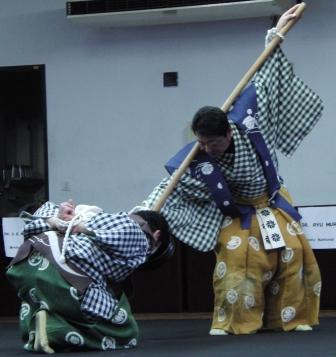
“Cool Japan: Wisdom of Japan” traditional Japanese “Kyogen” plays and workshop will be held at the Sri Dharmaloka Hall of the Kelaniya University commencing 3.00 p.m. on Thursday 20th February 2014. Ven. KorinOhtani, Senior Counsellor of Honganji Foundation, Japan and Prof. SarathAmunugama, Vice Chancellor, Kelaniya University will grace the occasion as Guests of Honour. The Kyogen performances and workshop has been co-organized by the Honganji Foundation, the Japan Foundation, the Executive Committee of Cool Japan: Wisdom of Japan, the Western Province Governors’ Office of the Government of Sri Lanka, the Embassy of Japan together with the support of the Kyoto National Museum, City of Kyoto, the Center for Traditional Industries in Kyoto and the local assistance of UB Finance PLC and Softlogic Finance PLC and the KelaniyaUniversity. The stage art “Kyogen” is one of the four traditional theatre art performances such as ‘Kabuki’ and Noh’ which belonged to the 14th century in Japan. Kyogen in particular had its origins in Kyoto, which is known to be home to one of the world’s oldest and foremost comedy theatres. Professional Kyogen actors of Mansaku Nomura & his Company, a popular Kyogen theatre company from Kyoto, Japan will stage “Kyogen – Busu”.Kyogen plays entitled “Waha”(Poison) directed by PriyankaraRatnayake and “KimbulKandulu”(Tears of a Crocodile) directed by Professor Patrick Ratnayake will also be staged by the students of the Drama Theatre and Image Arts Unit of the Kelaniya University. Lectures on Japanese traditional Kyogen art will also be delivered by Mr. Yukio Ishida of Nomura Mansaku Art School and on the Sri Lankan form of Kyogen art by Prof. Patrick Ratnayake. Admission to the Kyogen plays will be free of charge and has been organized as part of “Cool Japan: Wisdom of Japan” with a view to further promoting Japan-Sri Lanka cultural exchanges.All are welcome.
17th February 2014 “Cool Japan: Wisdom of Japan” Symposium and Workshop “Cool Japan: Wisdom of Japan” Symposium and Workshop will be held at the Sri Lanka Foundation Institute (SLFI) Auditorium, Colombo 7 on Wednesday 19th February 2014 from 3.00 p.m. Honourable Alavi Moulana, Governor of the Western Province and Ven. Korin Ohtani, Senior Counsellor of Honganji Foundation, Japan will grace the occasion as Guests of Honour. The symposium has been co-organized by the Honganji Foundation, the Japan Foundation, the Executive Committee of Cool Japan: Wisdom of Japan, the Western Province Governors’ Office of the Government of Sri Lanka, the Embassy of Japan together with the support of the Kyoto National Museum, City of Kyoto, the Center for Traditional Industries in Kyoto and the local assistance of UB Finance PLC and Softlogic Finance PLC. “Cool Japan” is relatively a new notion of contemporary Japan. The symposium is designed to promote a wider understanding and deeper appreciation of the cultural heritage and spirit of the Japanese people and will focus on the salient features of the roots of Japan’s spiritual culture, thought and philosophy as well as other manifestations of the Japanese heart and mind – particularly in terms of revealing “Cool Japan” on a deeper level. The symposium will also include DVD presentations featuring salient aspects of “Neo-Japonism and the Historic Roots of “Cool Japan”” and “The Wisdom of Japan: Harmony, Gratitude, and the Syncretistic Tradition” as well asa special performance of a traditional Japanese Kyogen play entitled “Bo-Shibari” by professional Kyogen actors of Mansaku Nomura & his Company, a popular Kyogen theatre company from Kyoto, Japan.
Panelists for the symposium will include His Excellency Mr.Nobuhito Hobo, Ambassador of Japan in Sri Lanka. Dr. Ryu Murakami, Director, Kyoto National Museum, Dr. Sunil Wijesiriwardena, Writer and Visiting Lecturer of Colombo University and Kelaniya University and Prof. H.D. Karunaratne, Professor of the University of Colombo as well as Mr. Yukio Ishida, Kyogen Player from Kyoto, Japan. The panel discussion will be led by His Excellency Mr. Nobuhito Hobo, Ambassador of Japan. All are welcome.
13th February 2014 Donation by the Association of Spouses of the Japanese Embassy Staff 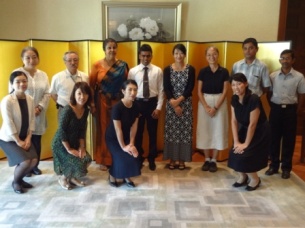
Donors and Recipients The Association of Spouses of the Japanese Embassy Staffs (ASJES) donated a sum of Rs. 250,610 to two NGOs, namely ‘Surangani Voluntary Service(SVS)’ and ‘Only One World (OOW)’. The presentation ceremony of the donation was held in a friendly atmosphere at the Japanese Ambassador’s official residence on Wednesday, 12th February, 2014. Funds for this donation were raised through the International Bazaar held with the participation of 19 countries and 11 organizations at the Hilton Colombo Residence on 1st December, 2013. The Association has been supporting activities of many NGOs in Sri Lanka over the past 30 years. 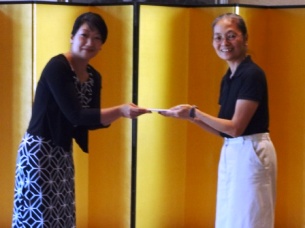 SVS was founded in 1992 and supports mainly preschool education in Sri Lanka. The organization was represented by DirectorMs. Shigeko Baba and other senior staff at the ceremony. The donation from ASJES will be utilized for improving teaching materials and for supporting livelihood at ‘Little Tree’, a center for handicapped children in Buttala in the Monaragala District. This has been the 13th donation from ASJES since 2001.
SVS was founded in 1992 and supports mainly preschool education in Sri Lanka. The organization was represented by DirectorMs. Shigeko Baba and other senior staff at the ceremony. The donation from ASJES will be utilized for improving teaching materials and for supporting livelihood at ‘Little Tree’, a center for handicapped children in Buttala in the Monaragala District. This has been the 13th donation from ASJES since 2001. 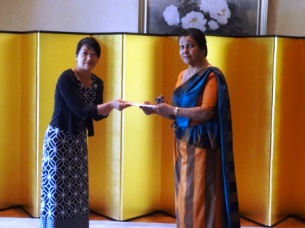 OOW was founded in 1991 by the former Ambassador of Sri Lanka to Japan Mr. Arthur Basnayake and his wife Mrs. Damini Basnayake. OOW grants scholarships to excellent students who could not attend schools owing to their poverty, and donates medical equipment to hospitals. The donation from ASJES will be utilized for awarding scholarships to one male and one female student studying at public schools to pursue their higher studies at universities. This has been the 2nd donation from ASJES since last year. Mr. R. P. A. Nuwan Tharaka Rajaguru, who was awarded a 4 year scholarship through OOW by ASJES last year, also attended this ceremony. After the speeches of Ms. Baba of SVS and Mrs. Basnayake, he expressed his gratitude for the scholarship and shared his life in the University and future plan with participants of the ceremony. In return, ASJES members told that they were glad and confident about those NGOs’ maximum use of ASJES’s humble but sincere donations.
OOW was founded in 1991 by the former Ambassador of Sri Lanka to Japan Mr. Arthur Basnayake and his wife Mrs. Damini Basnayake. OOW grants scholarships to excellent students who could not attend schools owing to their poverty, and donates medical equipment to hospitals. The donation from ASJES will be utilized for awarding scholarships to one male and one female student studying at public schools to pursue their higher studies at universities. This has been the 2nd donation from ASJES since last year. Mr. R. P. A. Nuwan Tharaka Rajaguru, who was awarded a 4 year scholarship through OOW by ASJES last year, also attended this ceremony. After the speeches of Ms. Baba of SVS and Mrs. Basnayake, he expressed his gratitude for the scholarship and shared his life in the University and future plan with participants of the ceremony. In return, ASJES members told that they were glad and confident about those NGOs’ maximum use of ASJES’s humble but sincere donations.
Japanese NGO receives grant for a Capacity Building project
on community-based disaster risk reduction in Sri Lanka 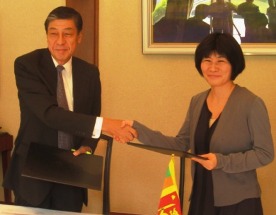 Japanese ambassador Nobuhito Hobo and Ms. Megumi Kuwana, Program Unit Chief of Civic Force signed the grant contract for a project entitled “Capacity Building project on community-based disaster risk reduction” on the 13thFebruary 2014 at the Ambassador’s Residence in Colombo.The project amounts to US$291,005 (approximately Rs. 37million) and is to be implemented for 1 year under the Grant Assistance for Japanese NGO Projects, a grant funding program of Japan’s Official Development Assistance (ODA). Civic Force, a Japanese disaster aid NGO, is actively involved in the reconstruction and rehabilitationof the Northeast Japan region as well as in emergency response in disaster struck areas in the Philippines and Thailand in the past.
Japanese ambassador Nobuhito Hobo and Ms. Megumi Kuwana, Program Unit Chief of Civic Force signed the grant contract for a project entitled “Capacity Building project on community-based disaster risk reduction” on the 13thFebruary 2014 at the Ambassador’s Residence in Colombo.The project amounts to US$291,005 (approximately Rs. 37million) and is to be implemented for 1 year under the Grant Assistance for Japanese NGO Projects, a grant funding program of Japan’s Official Development Assistance (ODA). Civic Force, a Japanese disaster aid NGO, is actively involved in the reconstruction and rehabilitationof the Northeast Japan region as well as in emergency response in disaster struck areas in the Philippines and Thailand in the past.
Sri Lanka experiences frequent disasters such as floods, landslides, drought and conflict. The Indian Ocean tsunami of 2004 left rural areas in the country devastated and highlighted the need for disaster management aid and a comprehensive response to deal with intertwined factors such as the impact of poverty and conflict.
This projectaims to enhance local communities’ capacities for disaster prevention and disaster management.During the first year of the project, capacity building workshops/trainings and networking meetings will be held in Colombo and Trincomalee in addition to a nationwide seminar for key persons involved in disaster management in Sri Lanka. The project is expected to improve local communities’ capacity to respond to disasters and to strengthen cross-sector collaboration and practical disaster management skills of participants. Commenting on the project Ms. Kuwana said “Since disaster management is everybody’s common concern, this project is a good occasion to tackle overall community development as well as to create achannel between grass-roots and the central government through cross-sector collaboration. If we could create a model of disaster management in Sri Lanka, which has been affected by many kinds of disasters, it would serve as a useful experience on disaster management in other countries, especially in the Asia Pacific Region.We, as a Japanese NGO, would like to utilize the lessons from the reconstruction and rehabilitation of the Northeast Japan.”
10th February 2014 “The Spirit of Budo” Exhibition- History of Japanese Martial Arts “The Spirit of Budō: The History of Japan’s Martial Arts”,anexhibition of Japanese martial arts culture will be held at the J.D.A Perera Gallery of the University of Visual and Performing Arts, No.46, Horton Place, Colombo 7 (Opposite the Army Hospital) from 22nd to 27th February 2014.
This rare exhibition is among a series of travelling exhibitions of the Japan Foundation which engages in international cultural exchange activities in cooperation with over 130 countries around the world. The exhibition will display 41 exhibits consisting of a variety of reproductions and originals of historical weapons such as bows and arrows, suits of armor and helmets, swords and their mountings etc. and is designed to provide viewers with an understanding about the brief history of Japanese martials arts- from battlefield combat techniques (bujutsu) to popular sports or physical exercises tempering body and spirit (budō). The exhibition also showcases the development and changes of Japanese martial arts from 8th century to 19th century and the reorganization of bujutsu to budō in the 19th and 20th centuries and how the spirit of martial arts is still inherent in the daily lives of Japanese people today. The exhibition is an excellent opportunity for viewers not only to become aware of Japanese martial arts, but also of people’s aesthetic awareness and creativity and Japan’s social history and the Japanese way of thinking from a new angle. The opening ceremony will be held on 22nd February 2014 at 10.00 a.m. to 12.00 noon and will also feature a special demonstration of several Japanese martial arts such as Judo, Aikido, Kyudo, Kendo and Iaido (traditional Japanese swordsmanship). The exhibition has been organized by the Embassy of Japan and sponsored by the Japan Foundation will be open to the public between 10.00 a.m. and 6.00.p.m. Entrance is free of charge.
27 January, 2014 Japan Extended US$ 1,248,046 for Humanitarian Demining in Northern Sri Lanka The Government of Japan has provideda total sum of US$ 1,248,046(approximately Rs. 160 million) in grant aid for humanitarian demining in Northern Sri Lanka under its GrantAssistanceforGrassrootsHumanSecurityProject(GGP). 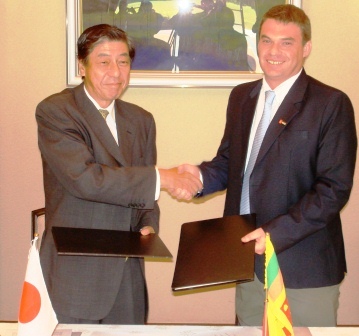
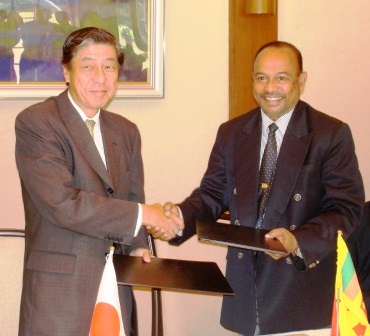
His Excellency Mr. Nobuhito Hobo, Ambassador of Japan His Excellency Mr. Nobuhito Hobo, Ambassador of Japan
and Mr. Gregory Secomb, Country Director, MAG and Mr. AnandaChandrasiri, Programme Manager, DASH
The ‘Project for Humanitarian Mine Actionfor Livelihood Recovery in Northern Sri Lanka’, implemented by Mines Advisory Group (MAG) has been provided a sum of US$ 591,447(approximately Rs. 77 million)while the ‘Project for Peace Building through Demining inNorthern Sri Lanka’ implemented by Delvon Assistance for Social Harmony Sri Lanka (DASH)has been provided a sum of US$ 656,599(approximately Rs. 86 million) both of which would contributeto expedite the efforts of the Government of Sri Lanka to make mine contaminatedareas safe lands for people to return and resume their livelihood. Japan has been a major donor supporting mine clearance in Sri Lanka to accelerate the return and resettlement of Internal Displaced Persons (IDPs) and to facilitate recommencement of agriculture and other livelihood activities of returnees. Since 2003, the Government of Japan has provided a sum of US$ 27 million for demining activities in the North and the East under its Grant Assistance schemes. The two Grant Contracts were signed between His Excellency Mr. Nobuhito Hobo, Ambassador of Japan and Mr. Gregory Secomb, Country Director, MAG and Mr. AnandaChandrasiri, Programme Manager, DASH respectively on 27 January 2014at the Ambassador’s Residence in Colombo.
Commenting on the provision of this grant Mr. Gregory Secomb, Country Director of Mines Advisory Group noted that MAG was extremely pleased to be a recipient of this new Grant Assistance for Grassroots Human Security Project, which had been announced by the Embassy of Japan today.
Mr. Ananda Chandrasiri, Demining Program Manager of DASH noted that the mine and UXO problem in Sri Lanka had been drastically reduced due to the invaluable assistance of the Government of Japan and other friendly countries / donors of Sri Lanka, and also the commitment of our Government, demining operators and other stakeholders of mine action in Sri Lanka.
Copyright (C) 2012 Embassy of Japan in Sri Lanka Legal Matters | About Accessibility | Privacy Policy |
No.20, Srimath R.G. Senanayake Mawatha, Colombo7, Sri Lanka
Tel: +94-11-2693831/2693832/2693833
FAX: +94-11-2698629



